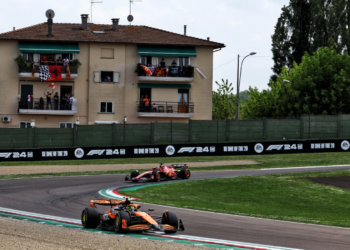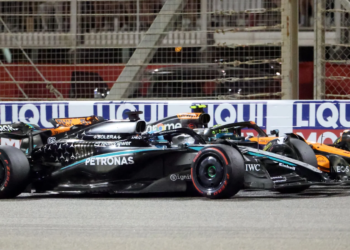Thailand’s bid to arrive on the Formula 1 calendar is gathering momentum after Prime Minister Srettha Thavisin met with the sport’s CEO Stefano Domenicali at Imola.
Thavisin was present for the Emilia Romagna Grand Prix as part of an official visit to Italy amid the Thai government’s push to bring an F1 race to the streets of Bangkok.
Autosport understands that Thavisin is keen to bring Red Bull on board to back the project, with a 2027 or ’28 starting point mooted.
Red Bull is a logical suitor to partner on the project owing to majority shareholder Chalerm Yoovidhya, who is of Thai nationality.
“In line with the Thai Government’s intention to bring F1 racing to Thailand in the near future, I visited the Autodromo Enzo e Dino Ferrari and had a discussion with executives of the Formula One Group,” Thavisin wrote on social media.
“This resonates with our policy to place Thailand on the global radar for international events and activities.”

After successfully expanding in the United States of America and the Middle East, a Thai GP aligns with F1’s next target for expansion – Asia.
The Thai bid was discussed between Domenicali and Thavisin when the F1 CEO visited the latter in April and the repeat meeting this past weekend shows Thailand’s plan has strong foundations.
Thailand isn’t the only Asian nation keen to take a slice of the F1 pie, with the South Korean city of Incheon penning a letter of intent to the series regarding a street-based GP last month.
With the F1 calendar at a record 24 races – one below the allowed limit of 25 as per the current Concorde Agreement – a Thai GP would likely mean an existing race would fall away.
A number of European venues are on short/expiring contracts, such as Imola, which has a deal running through 2025, or Barcelona, which has a contract that expires in 2026, the same year a Madrid-based Spanish GP will be introduced.
Domenicali has hinted that European races could be rotated to facilitate further expansion of the F1 calendar in new markets.
“[2026] is a year where there will be a lot of grands prix, mainly in Europe, where we have different options that we can take,” Domenicali said in February.
“It is clear that if you see the development of our regionalisation of the calendar, we have moved out from being European-centric to a very worldwide development, that needs to be kept into the future.”









